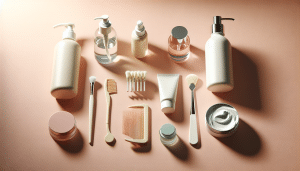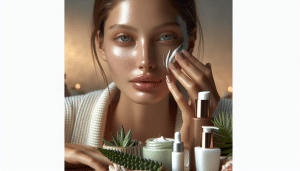You Can Transform Your Skin With Science
Natalie Brooks August 30, 2025
Unlock science-backed secrets for radiant skin as you discover powerful routines, ingredient insights, and expert tips in this wellness and beauty guide. Learn how real habits and proven methods foster long-lasting beauty that you can genuinely feel.
Understanding Skin Wellness: More Than Just Looks
Skin wellness is more than surface-level beauty; it reflects broader health and lifestyle factors. Many people equate glowing skin with special creams, but genuine vibrancy often begins within—rooted in hydration, nutrition, sleep, and self-care routines. Hydration, for example, maintains skin elasticity by supporting internal cellular processes that protect against dryness and premature signs of aging. Choosing water-rich foods, along with direct hydration, helps balance this process naturally.
The skin serves as a protective barrier, constantly exposed to environmental stress. Pollution, UV rays, and harsh cleansers can disrupt its balance. Building resilience involves daily care practices such as consistent cleansing, sun protection, and regular moisturization. Each action supports your skin’s natural microbiome, helping to keep it healthy and resilient against life’s little stressors.
Integrating wellness principles into beauty routines blends science with intuition. Healthy skin stands as an external signal of internal balance, echoing factors like balanced nutrition, gentle self-care, and stress management. By nurturing your skin as an ongoing wellness project, you can enjoy both immediate and lasting results, without chasing elusive miracles.
Science-Driven Ingredients: What Matters Most
Not all skincare ingredients are created equal. Dermatologists often highlight retinoids, hyaluronic acid, ceramides, vitamin C, and niacinamide as particularly effective, due to extensive clinical evidence backing their benefits. Retinoids help stimulate collagen, reducing fine lines, while vitamin C supports environmental defense and brightening. Hyaluronic acid, a naturally-occurring humectant, draws moisture into the skin for a plumper, more youthful appearance.
Understanding the role of these science-driven ingredients can empower you to make informed choices. For example, ceramics help restore the skin barrier, crucial for retaining hydration and maintaining smooth texture. Antioxidants fight free radical damage caused by stress and pollutants, which can show up as dullness, wrinkles, or roughness over time. Layering these ingredients into your routine, with sun protection, enhances their positive effects.
Ingredient concentration and product formulation matter as much as ingredient type. Even a popular compound like niacinamide—known for minimizing pores and evening tone—needs to be present in the right concentration to be effective. Reading labels and understanding what scientific research says about dosages and combinations helps ensure you’re getting tangible results, not just trendy promises.
Building a Personalized Routine for Lasting Results
No single skincare routine works for everyone. Personal biology, lifestyle, age, and specific concerns—like sensitivity, acne, or hyperpigmentation—all play a role in what will work best for you. Start simple: a gentle cleanser, a targeted treatment, moisturizer, and sunscreen. Over time, you can add targeted products as your needs evolve.
Sticking to a consistent routine delivers better results than chasing new products each month. Skin needs time to adjust to new ingredients, and hasty switching can cause irritation or setbacks. Track how your skin reacts, noting improvements or sensitivities, and tweak your routine based on these observations. The process is uniquely yours; patience lets the benefits shine.
Consider seeking evidence-based advice for specific concerns, especially if you experience persistent issues. Dermatologist recommendations and public resources from reputable organizations offer guidance rooted in peer-reviewed research rather than marketing hype. When building a routine, prioritize products with multi-functional benefits—such as niacinamide or ceramides—instead of overloading your regimen with overlapping actives.
The Role of Nutrition and Lifestyle in Skin Health
External applications are only part of the story. Nutrition—especially antioxidant-rich fruits, vegetables, and omega-3 fatty acids—has a documented impact on the skin’s resilience and glow. These nutrients combat oxidative stress, support collagen formation, and reduce inflammation, all of which show up on your face. A balanced diet is foundational to a sustainable beauty strategy.
Sleep and stress management play powerful roles. Consistent lack of sleep or chronic stress increases cortisol, which can aggravate breakouts or eczema. Practicing relaxation techniques such as mindfulness, meditation, or gentle exercise supports your body’s natural renewal cycles, giving your skin a chance to repair. The effects might seem subtle but often accumulate for visible transformation over time.
Lifestyle choices also include habits like avoiding smoking or excessive alcohol consumption. These factors can dull the skin and accelerate aging. Sun safety is paramount—using a broad-spectrum sunscreen daily is one of the most effective steps anyone can take. Linking nutrition, sleep, stress reduction, and smart daily habits weaves together overall wellness and beauty in an authentic, impactful way.
Debunking Myths: Marketing Claims Versus Reality
The beauty industry teems with bold promises and trendy products that may not live up to their reputation. Scientific research consistently shows that miracle solutions rarely exist and that consistent, simple routines usually deliver more benefits over time. Separating marketing claims from evidence-backed options is a cornerstone of confident, empowered self-care.
Many products tout exotic botanicals, luxury extracts, or overnight renewal, but may lack rigorous studies to support their claims. Always look for peer-reviewed evidence or dermatologist endorsements. For example, while natural oils can be nourishing for some, others may experience breakouts or reactions. Critical thinking and understanding your skin’s specific needs go a long way.
Transparency is key. Brands that share clinical studies, disclose full ingredient lists, and avoid overpromising are generally more trustworthy. Consider public health resources and independent review platforms for unbiased perspectives on effectiveness and safety. Trusting science and your own experiences offers a balanced way to enjoy modern wellness and beauty advances.
Embracing Self-Care as a Beauty Ritual
Self-care enhances the value of any skincare routine. These moments foster positivity, mindfulness, and a feeling of control in a fast-paced world. Whether it’s a gentle facial massage, aromatherapy, or simply taking a quiet moment each day, these rituals nourish both body and mind, amplifying the visible benefits on your skin.
Regular self-care connects appearance with overall wellness. This holistic approach can inspire healthier choices, greater self-confidence, and deeper satisfaction with your natural beauty journey. Instead of focusing solely on outward changes, notice how these practices foster resilience, optimism, and contentment that radiate from within.
Remember, the best results often come from balanced habits and genuine self-kindness, not extreme regimens. Tuning into your skin’s feedback and seeking out small daily joys helps you maintain progress, manage setbacks gracefully, and experience meaningful, sustainable beauty transformation.
References
1. Harvard Health Publishing. (n.d.). Skin care and aging. Retrieved from https://www.health.harvard.edu/staying-healthy/skin-care-and-aging
2. Mayo Clinic. (n.d.). Healthy Skin: Care instructions. Retrieved from https://www.mayoclinic.org/healthy-lifestyle/adult-health/in-depth/skin-care/art-20048237
3. American Academy of Dermatology Association. (n.d.). Skin care: Tips for healthy skin. Retrieved from https://www.aad.org/public/everyday-care/skin-care-basics/care/healthy-skin
4. U.S. National Library of Medicine. (n.d.). Nutrition and skin health. Retrieved from https://medlineplus.gov/nutrition.html
5. Johns Hopkins Medicine. (n.d.). Stress and skin. Retrieved from https://www.hopkinsmedicine.org/health/conditions-and-diseases/stress-and-your-skin
6. Cleveland Clinic. (n.d.). Sleep and skin health. Retrieved from https://health.clevelandclinic.org/sleep-and-skin-health








